 Petzlover
Petzlover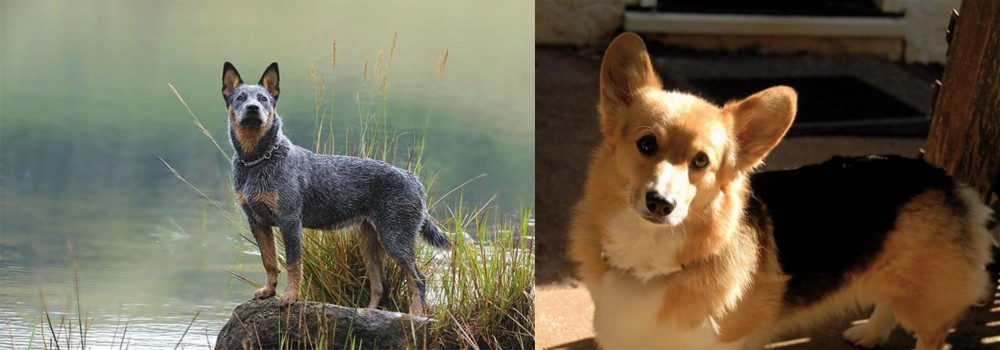 Blue Healer is originated from Australia but Dorgi is originated from United Kingdom. Blue Healer may grow 21 cm / 9 inches higher than Dorgi. Blue Healer may weigh 10 kg / 23 pounds more than Dorgi. Both Blue Healer and Dorgi has same life span. Both Blue Healer and Dorgi has almost same litter size. Both Blue Healer and Dorgi requires Low Maintenance.
Blue Healer is originated from Australia but Dorgi is originated from United Kingdom. Blue Healer may grow 21 cm / 9 inches higher than Dorgi. Blue Healer may weigh 10 kg / 23 pounds more than Dorgi. Both Blue Healer and Dorgi has same life span. Both Blue Healer and Dorgi has almost same litter size. Both Blue Healer and Dorgi requires Low Maintenance.
 It was in 1802 that George Hall arrived in New South Wales, establishing 2 cattle stations. He had a problem – getting his thousands of cattle to the Sydney markets. He began looking at the prospect of a droving dog and imported a number of dogs of which a blue mottled dog emerged.
It was in 1802 that George Hall arrived in New South Wales, establishing 2 cattle stations. He had a problem – getting his thousands of cattle to the Sydney markets. He began looking at the prospect of a droving dog and imported a number of dogs of which a blue mottled dog emerged.
The dogs were crossed with dingoes and by 1840 the Halls Heelers were used by the Halls. However with the death of one of the Halls, their cattle stations went to action and the dogs, the Halls Heelers became available.
The dogs attracted attention, and the term ‘Australian Cattle Dog’ was adopted. The name referred to those dogs coming from Thomas Hall's ‘Heelers’. There have been many arguments about the origin of the breed, but the red or blue offspring known as Hall's Heelers were proven cattle drovers, and with further breeding experiments which included the Australian Kelpie, dingoes and the Dalmation, by 1893, the tough, robust working breed known as the Blue Heeler or the Australian Cattle Dog came about.
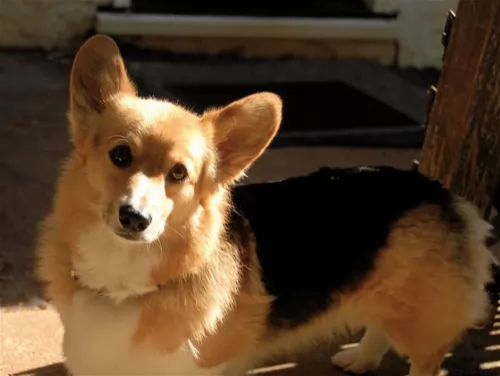 The Dorgi is a designer crossbreed whose origins are not entirely known, however it is a popular breed, being a mix between a Dachshund and a Pembroke Welsh Corgi.
The Dorgi is a designer crossbreed whose origins are not entirely known, however it is a popular breed, being a mix between a Dachshund and a Pembroke Welsh Corgi.
The Dorgi itself is new breed and therefore has a short history, but both dogs used to develop the Dorgi – the Dachshund and the Corgi – have their own unique histories.
The Dachshund originated in Germany in the 1500s and the Pembroke Welsh Corgi originated in the United Kingdom centuries ago.
 Blue Heelers are medium-sized, sturdy, compact dogs who are somewhat longer than tall. The female Blue Heeler measures roughly 43–48cm at the withers, while the male measures about 46–51cm. If your Blue Heeler is in tip top condition, he’ll weigh about 15 to 22 kilograms. They are muscular with pointed, erect ears, dark eyes and long tails which are mostly hanging downwards. Their dense coats are blue- or red speckled and sometimes with tan markings.
Blue Heelers are medium-sized, sturdy, compact dogs who are somewhat longer than tall. The female Blue Heeler measures roughly 43–48cm at the withers, while the male measures about 46–51cm. If your Blue Heeler is in tip top condition, he’ll weigh about 15 to 22 kilograms. They are muscular with pointed, erect ears, dark eyes and long tails which are mostly hanging downwards. Their dense coats are blue- or red speckled and sometimes with tan markings.
The Blue Heeler is a ball of energy and he is clever too. You won’t find him sitting around for too long, and if there is sign of a walk or a ball game, he’s in! He is an independent dog, and although he makes a wonderful family pet, he tends to attach himself to that one special person in his life. He is a natural watchdog and protector of his human family.
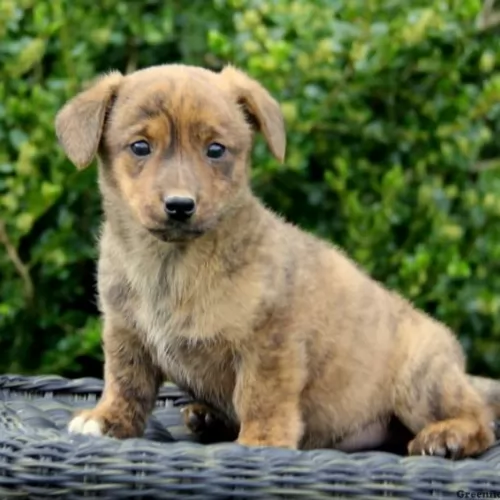 The Dorgi is known for his long body, short legs and the erect ears of the corgi. He is a small dog, measuring roughly 20-30cm in height and weighing in the region of 6 – 12kg.
The Dorgi is known for his long body, short legs and the erect ears of the corgi. He is a small dog, measuring roughly 20-30cm in height and weighing in the region of 6 – 12kg.
Many people also refer to him as the sausage dog. The look of your Dorgi can depend quite a bit on whether he looks more like a Corgi or a Dachshund, so for instance the coat can be short and smooth, or thick and coarse.
They can surprise you with their looks, and some are born with long tails while others are born with bobtails. The coat comes in many colors too, from tan to brown to black and white or a mixture of these colors.
The Dorgi is full of the joys of life, just loving all the attention he gets from his human family. Of course, in return for this affection, he offers love, loyalty and plenty of fun and games.
He is an energetic breed too and is always ready to join in any games with the children in the home as well as with cats and dogs living in the home too.
Training and socialization will also be needed for the Dorgi who is intelligent and easy to train. He has wonderful behavior when trained, being obedient and relaxed around visitors to your home.
Social and sweet, this is one little dog who is guaranteed to make a wonderful pet and companion, as he loves human companionship and never wants to be left alone for too long. He is alert too, so while he is small and no real threat to an intruder, he is willing to do what it takes to protect his human family and to bark to alert you.
 Training and socializing of your Blue Heeler will ensure that your dog does what you want him to. The Blue Heeler is an intelligent, responsive dog and training can benefit him, turning him into an outstanding family pet, good with children and other pets in the home.
Training and socializing of your Blue Heeler will ensure that your dog does what you want him to. The Blue Heeler is an intelligent, responsive dog and training can benefit him, turning him into an outstanding family pet, good with children and other pets in the home.
He is a playful, affectionate pet who doesn’t take easily to strangers, and this is what makes him such an excellent guard dog.
Your Blue Heeler is not an apartment dog as he requires a lot of exercise, and cooping him indoors for too long with nothing to do can lead to destructive behavior.
Head-strong, independent and robust, your Blue Heeler will need a firm owner who is boss. Add to the firm owner a lot of love and care, and you’ll have a devoted friend.
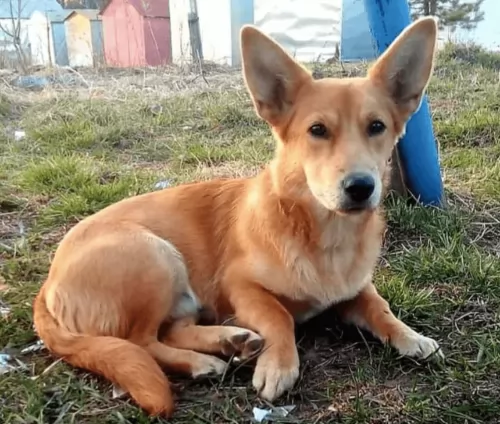 The Dorgi is such a sweet little designer breed of dog that happens to also be low maintenance. Apart from being a little dog full of energy and attitude, he is loving and loyal as a family pet too, being gentle around children and making a splendid pet.
The Dorgi is such a sweet little designer breed of dog that happens to also be low maintenance. Apart from being a little dog full of energy and attitude, he is loving and loyal as a family pet too, being gentle around children and making a splendid pet.
He isn’t going to eat you out of hearth and home either and he is a fairly healthy breed as well.
When you bring a Dorgi into your home, you’re bringing in a whole lot of happiness as he is an awesome family member who wants to be counted in on everything the do.
 Australian cattle dogs are healthy and can live up to 15 years of age, but even so there are some genetic conditions that you will need to be aware of following
Australian cattle dogs are healthy and can live up to 15 years of age, but even so there are some genetic conditions that you will need to be aware of following
Eye issues which includes progressive retinal atrophy – this disease is an inherited disease of the retina of the eye where the rod cells are destined to die. Fortunately it is not painful for the dog. There are different types of inherited retinal degenerative diseases in dogs but going into detail with them is beyond the scope of this article. For more information you can chat to your vet.
Recessive piebald elleles - the Blue Heeler has recessive piebald alleles which can produce white in the skin and coat and which is linked to congenital hereditary deafness.
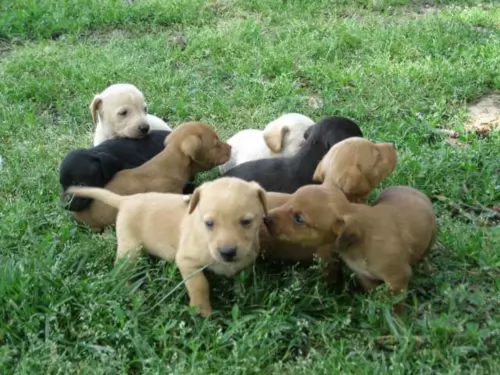 Because the Dorgi is a hybrid breed, he promises to be quite healthy, but on the other hand, it could be that he inherits some of the common health problems associated with either the Corgi or the Dachshund.
Because the Dorgi is a hybrid breed, he promises to be quite healthy, but on the other hand, it could be that he inherits some of the common health problems associated with either the Corgi or the Dachshund.
Obesity is always a problem with a small dog, as they’re so sweet, you just want to be popping treats into their mouths all the time. It is important to follow a healthy diet for your pet however if you want to stave off common dog disorders.
An obese dog faces a shorter life expectancy, and some of the major health issues that an obese Dorgi has to contend with is diabetes, osteoarthritis, high blood pressure and cancer among others. Certainly better, healthier pet food choices can help save you money on vets fees.
Diabetes in canines is just as serious as in humans and its a glucose-insulin complication where the pancreas isn’t producing enough insulin.
Sugars build-up in the blood and these can cause damage to your dog’s eyes, heart and kidneys. You may notice your pet gaining weight, being more thirsty, being tired and having cloudy eyes which could be indicative of cataracts. Take your pet to the vet as insulin shots may be required.
 Remember that your Blue Heeler was once a full time cattle dog where he used to become totally and utterly exhausted from herding cattle. This is what he loved – the activity. If you have a Blue Heeler, you will need to provide him with plenty of exercise.
Remember that your Blue Heeler was once a full time cattle dog where he used to become totally and utterly exhausted from herding cattle. This is what he loved – the activity. If you have a Blue Heeler, you will need to provide him with plenty of exercise.
If you live on a farm, your Blue Heeler will be in his element because he can run, walk and swim to his heart’s content. If you keep your Blue Heeler in your back garden, you will need to provide him with ball games, rope games, long walks, running on a leash as you cycle and other activities.
Your Blue Heeler has a short, weather-resistant double coat. He’s not a heavy shedder, but he will have his share of seasonal shedding, so it’s a good idea to get into the habit of brushing him at least twice a week. This will get rid of all those loose hairs and keep his skin healthy by getting the blood flowing and distributing his natural oils.
Giving the best dog food for your Blue Heeler will come from either your home made food or a top quality commercially manufactured dog food. He is such a high energy dog, that your veterinarian can advise you on a dog food specially designed for high energy breeds.
These foods are well balanced and are enriched with amino acids and vitamins, promoting healthy bones and joints. Remember to include some raw meat into your dog’s diet and to ensure a constant source of cool, fresh water.
Ensure your Blue Heeler’s ongoing health by paying attention to ears, nails and teeth.
 Your Dorgi’s coat will be shortish, and shedding is minimal so a good brush twice a week will be perfect for this pet of yours, and he will love the attention you give him while doing so.
Your Dorgi’s coat will be shortish, and shedding is minimal so a good brush twice a week will be perfect for this pet of yours, and he will love the attention you give him while doing so.
He is an active breed so he will require regular exercise. Take him with you on your walks. Even if you have a small garden, he’ll love fetching a ball for you.
If you give your Dorgi commercially manufactured dog food, remember to be guided by the feeding recommendations to avoid obesity.
Its always a good idea to add in some raw meat to his diet to keep his nose wet and his skin free from being dry and itchy. You can also add in some cooked brown rice, vegetables and chicken for variety.
Always ensure that a bowl of fresh water is constantly available.